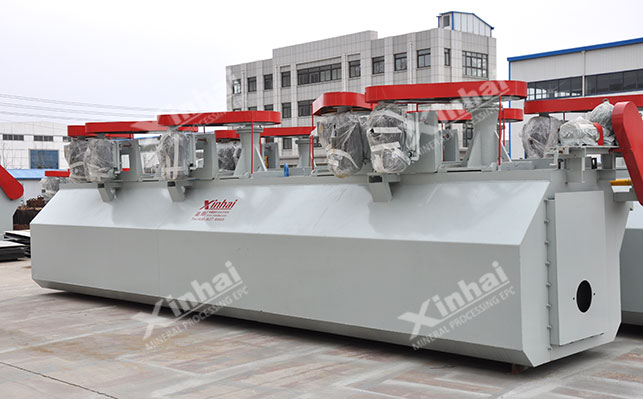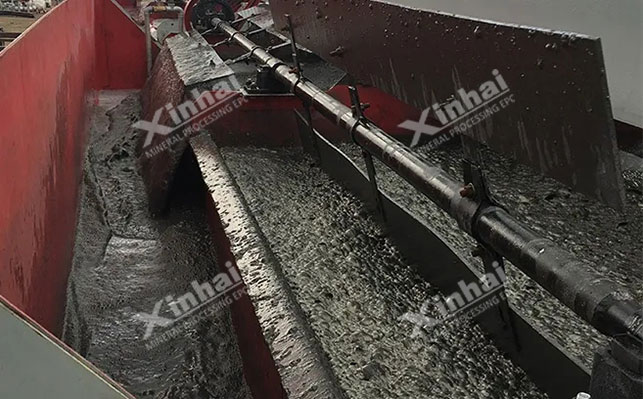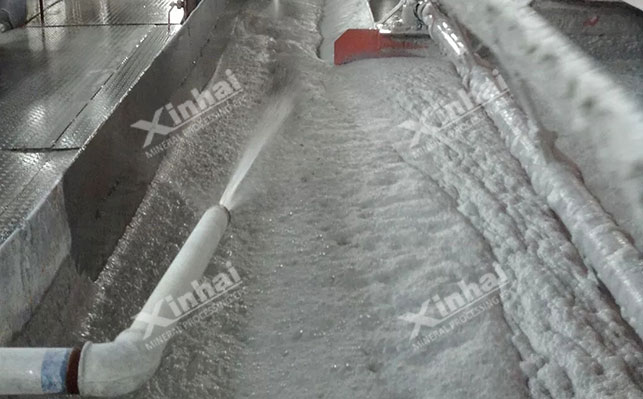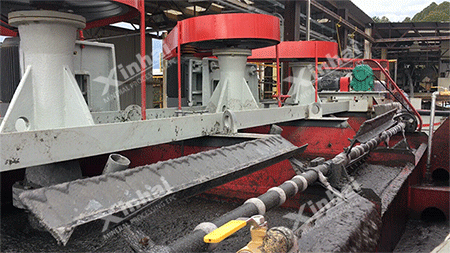
15311826613
Click to add WeChatDuring the production process of the flotation machine, whether the flotation effect is good or not can be determined by looking at the foam effect. Flotation foam is the main factor affecting the flotation effect. In daily processing plants, experienced technicians can know the effect of the flotation machine by observing the foam. For this reason, it can be effectively adjusted by adjusting the chemicals or adjusting the impeller speed to quickly restore the normal operation of the flotation machine.

Generally, different ores are attached to the surface of the flotation foam of a flotation machine, and their quantity, particle size, color, gloss, density and amount of foaming agent, etc. , it is also these factors that determine the appearance of the foam, so we can determine the flotation effect by observing the reality, size, color, luster, shape, thickness, strength, brittleness and viscosity, sound, etc. of the flotation foam. Let’s do it together. Find out!
Generally, mineral processing plant operators will use the foam to judge the degree of flotation mineralization. If there are too many mineral particles attached to the surface of the foam, If it is dense, it is real, otherwise it is virtual. To obtain ideal flotation results, the mineralized foam in the roughing tank must be "solid" and the mineralized foam in the tail cleaning tank must be "empty".
In the same flotation operation, the changes in the virtual and solid flotation foam can also reflect the changes in flotation. If the raw ore grade is high and the chemicals are used appropriately, the foam at the roughing head will be solid. If If there are too many inhibitors and too few collectors, the flotation foam will become weak. Therefore, we can determine whether the flotation machine's reagents are being used normally by observing the virtuality and solidity of the foam.

In the flotation operation, the ideal bubble size can be obtained by adjusting and selecting the appropriate bubble size. Mineralized foam. As for foam size, the properties of each mineral are different, so the appropriate foam size will also vary. Under normal conditions (sulfide ore flotation), when the diameter of the flotation foam is above 8 to 10 cm, it is a large bubble, when the diameter is 3 to 5 cm, it is a medium bubble, and when the diameter is below 1 to 2 cm, it is a small bubble.
The size of flotation foam bubbles is closely related to the degree of mineralization of the bubbles. When the degree of bubble mineralization is good, the size of the flotation foam bubbles is medium, so medium bubbles are more common in the roughing zone and the fine selection zone; when the degree of bubble mineralization is poor, the flotation foam bubbles are easy to merge with each other to form large bubbles; when the bubbles are When the degree of mineralization is extremely poor, although small bubbles form large bubbles through continuous mergers, they cannot withstand the influence of fluctuations in the slurry surface and are easily broken, resulting in many small bubbles at the tail of the sweeping area.
The size of flotation foam bubbles is usually controlled by flotation chemicals. In general, the greater the amount of foaming agent, the smaller the bubbles; the greater the amount of lime, the larger the bubbles; the greater the amount of inhibitor, the smaller the bubbles.
The color of flotation foam products is usually determined by the color of the ore adhering to the foam surface. For example, the flotation foam of chalcocite is lead-gray, the foam of chalcopyrite flotation is golden yellow with green, the foam of galena flotation is lead-gray, the foam of sphalerite flotation is light brown, and the foam of hematite flotation is light brown. Brick red in color.
In the sweeping area, the tail foam is often the color of white water film. If the color of the flotation foam in the sweep area becomes darker, it indicates that there is more metal loss in the tailings. When the color of the floating minerals in the concentration area is darker, it indicates that the quality of the concentrate is better.

The luster of flotation foam is also caused by the luster of the ore and the water film adhered to the surface of the foam. Determined by gloss. Generally, sulfide minerals show a strong metallic luster, while oxidized minerals mostly show semi-metallic luster or earthy luster. When the flotation foam in the sweep zone exhibits a semi-metallic luster, it indicates greater metal loss. In addition, the mineral particles of floating ore are coarse, the foam surface is rough, and the luster is weak; the mineral particles of floating ore are fine, the foam surface is smooth, and the luster is strong.
When the foam mineralized by medium hydrophobic mineral particles is formed on the surface of the slurry, there is sufficient water, and the shape of each bubble is obvious. If the foam stays on the slurry surface for a long time, the mineral is highly hydrophobic, and after the bubble wall dries up and becomes incomplete, the shape of the bubble will be blurry.
The thickness and thinness of the flotation foam layer are mainly related to the amount of frother and the degree of bubble mineralization. The amount of foaming agent is large, the raw ore grade is high, the concentration is large, the degree of mineralization is good, the foam layer is thicker, and vice versa. In addition, if the floating ore particles are too coarse, it is difficult to form a thick foam layer. In the selection area, the slurry level is low, the foam layer is thick, and the concentrate grade is high. In the sweeping area, the slurry level is kept high, and the floating minerals can be scraped out in time, resulting in foam. The thinner the layer, the higher the recovery rate.
If the brittleness of the flotation foam is large, the stability will be poor, and the flotation foam will easily burst and sometimes be difficult to scrape out. On the contrary, if the flotation foam is If the foam viscosity is too high and the stability is too strong, the flotation machine will "run out of the tank", destroying the normal flotation process and causing difficulties in concentrate transportation.

When the scraper scrapes the flotation foam into the foam tank, if The "rustling" sound indicates that the flotation foam contains a large number of minerals with larger specific gravity and coarser particle size.
The above eight flotation foam appearance phenomena are important basis for judging the effect of flotation machine. Of course, the apparent phenomenon of flotation foam will vary depending on the flotation area, but specific areas are usually accompanied by certain specific phenomena.